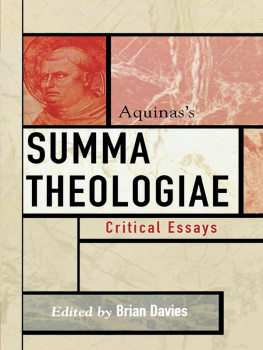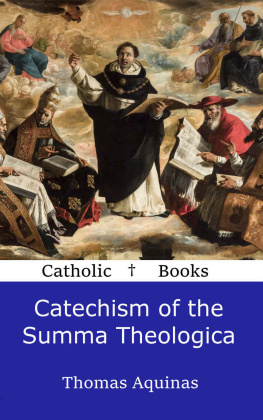Thomas Aquinas - Ways of God
Here you can read online Thomas Aquinas - Ways of God full text of the book (entire story) in english for free. Download pdf and epub, get meaning, cover and reviews about this ebook. year: 2013, publisher: Sophia Institute Press, genre: Science. Description of the work, (preface) as well as reviews are available. Best literature library LitArk.com created for fans of good reading and offers a wide selection of genres:
Romance novel
Science fiction
Adventure
Detective
Science
History
Home and family
Prose
Art
Politics
Computer
Non-fiction
Religion
Business
Children
Humor
Choose a favorite category and find really read worthwhile books. Enjoy immersion in the world of imagination, feel the emotions of the characters or learn something new for yourself, make an fascinating discovery.
- Book:Ways of God
- Author:
- Publisher:Sophia Institute Press
- Genre:
- Year:2013
- Rating:3 / 5
- Favourites:Add to favourites
- Your mark:
- 60
- 1
- 2
- 3
- 4
- 5
Ways of God: summary, description and annotation
We offer to read an annotation, description, summary or preface (depends on what the author of the book "Ways of God" wrote himself). If you haven't found the necessary information about the book — write in the comments, we will try to find it.
Ways of God — read online for free the complete book (whole text) full work
Below is the text of the book, divided by pages. System saving the place of the last page read, allows you to conveniently read the book "Ways of God" online for free, without having to search again every time where you left off. Put a bookmark, and you can go to the page where you finished reading at any time.
Font size:
Interval:
Bookmark:
The Ways of God
St. Thomas Aquinas
SOPHIA INSTITUTE PRESS
Manchester, New Hampshire
The Ways of God is an English translation of De divinis moribus by St. Thomas Aquinas. The translation was made by Raissa Maritain and Margaret Sumner and published as The Divine Ways by the Basilian Press in London, Ontario, in 1946. This 1995 edition includes minor corrections and revisions to the Maritain/Sumner translation.
Copyright 1995 Sophia Institute Press All rights reserved Jacket design by Joan Barger
No part of this book may be reproduced, stored in a retrieval system, or transmitted in any form or by any means, electronic, mechanical, photocopying, or otherwise, without the prior written permission of the publisher, except by a reviewer, who may quote brief passages in a review.
Sophia Institute Press
Box 5284, Manchester, NH 03108
1-800-888-9344
www.SophiaInstitute.com
Nihil Obstat: Rev. W. T. Flannery, S.T.D. Imprimatur: John T. Kidd, D.D. London, Ontario, March 7, 1942
Library of Congress Cataloging-in-Publication Data Thomas, Aquinas, Saint, (1225?-1274).[De divinis moribus. English] The Ways of God / St. Thomas Aquinas.
p. cm.Originally published: The divine ways. Windsor, Ont.
Christian Culture Press, Assumption College, 1942.
ISBN 0-918477-30-1 (pbk. : alk. paper)
1. GodAttributes. I. Title.BT130. T56
1995 95-36706 231.4dc20 CIP
Books by St. Thomas Aquinas
available from
Sophia Institute Press :
Aquinass Shorter Summa
The Ways of God for Meditation and Prayer
The Aquinas Catechism
The Aquinas Prayer Book
Preface
This beautiful meditation is Opusculum 62 of the Roman edition of the Works of St. Thomas Aquinas (published in Latin in 1570 by order of Pope Pius V). It was introduced to the English-speaking world in a 1942 translation by Margaret Sumner and Raissa Maritain, wife of the internationally known Thomistic scholar, Jacques Maritain.
Although The Ways of God was included in the 1570 edition of St. Thomass works, modern scholars have been unable to document with academic certainty that it was actually written by St. Thomas himself.
Remarking on this, Raissa Maritain in her 1946 edition made the observation: If it is not actually by the hands of St. Thomas, it is, in any case, the faithful interpreter of his doctrine, and its elevated spirit as well as its candor render it worthy of being placed under the name of the Angelic Doctor.
We agree; and for this reason we are pleased to make this little work available once again to the English-speaking public.
The Publisher
NOTE: The biblical quotations in these pages follow the enumeration found in the Douay-Rheims edition of the Old and New Testaments. Quotations from the Psalms and some of the historical books of the Bible have been cross-referenced with the differing names and enumeration in the Revised Standard Version, using the following symbol: (RSV = ).
The ways of God
Be ye perfect as your heavenly Father is perfect. Holy Scripture never orders and never counsels us to do the impossible. By these words, then, the Lord Jesus does not command us to accomplish the very works and ways of God, which no one can attain in perfection.
But He invites us to model ourselves on them, as much as is possible, by applying ourselves to imitate them. We can do this with the help of grace and we should do so. And as the Bishop John said, nothing is more suitable to man than to imitate his Creator, and to carry out, to the degree that he is able, the will of God.
The immutability of God
In God, there is a primary perfection, which is that He never changes in His nature.
God Himself declares this by the prophet, I am God and I do not change,
Created things bear in themselves a trace of this changelessness, in that they are not changeable in their essence; consider, for example, angels, the soul, the heavens, and the four elements.
And if sometimes God sends His angels, and sometimes does not send them; if at times He withdraws His grace and at times confers it; if now He punishes sins, and now cloaks them, the change is in creatures, but not in the Creator.
In short, the changelessness of Gods decrees with regard to the good and the bad will confirm itself at the last day, when He will give forever to the good a recompense superior to their merits, and will inflict forever on the bad a punishment that is less than the gravity of their sins.
Our own constancy
Let us strive therefore to acquire stability of spirit, in order that, broken by adversity or tempted by prosperity, we never depart from the right way, that we may say with Job, My justification, which I have begun to hold, I will not forsake; for my heart doth not reproach me in all my life,
But, alas, how inconstant we are in holy meditations, in lawful affections, in steadfastness of conscience, and in a right will. Ah, how suddenly we pass from good to bad, from hope to groundless fear, and from fear to hope, from joy to unreasonable grief, and from sadness to vain joy, from silence to loquaciousness, from gravity to trifling, from charity to rancor or to envy, from fervor to tepidity, from humility to vainglory or to pride, from gentleness to anger, and from joy and spiritual love to carnal love and pleasure.
In this way we never remain one single instant in the same condition, unless, alas, we are constant in inconstancy, in infidelity, in ingratitude, in spiritual defects, in imperfection, in negligence, in frivolity, and in ill-regulated thoughts and affections. Even the motions that trouble our exterior senses and our limbs reveal our interior instability.
Nevertheless, we should work without ceasing to acquire constancy of soul, so that we may conduct ourselves in all circumstances with the qualities of equanimity, maturity, and sweetness.
The delight of God in goodness
In God, there is another perfection: all goodness is pleasing to Him by nature, always and everywhere, whether it be in angels, in men, or in other creatures.
This goodness includes qualities of the body (like beauty, strength, grace, sweetness, and the fullness of natural maturity), qualities of the soul (such as perspicacity of the spirit, tenacity of memory, subtlety of the intelligence, rectitude of the will, and freedom of the will), and natural gifts (such as the ability to read well, to sing well, to preach well, to be eloquent, sober, and continent, and to have well-regulated habits). Finally, these goods include the gifts of grace, which please God above everything gifts such as faith, hope, charity, humility, patience, mercy, obedience, truth, temperance, justice, prudence, and knowledge.
Similarly all evil displeases God everywhere and always and in whatever it exists. As justice is the enemy of injustice and impurity of purity, so the malice of man opposes the goodness of God, because it lessens or even completely destroys the divine good that grace gives to nature.
Our own delight in goodness
All that is good should also please us, always and everywhere and in every creature. We must protect and support goodness with solicitude, and resist boldly those who combat it.
We should always and everywhere detest evil with all our heart and exert ourselves to prevent it because it is injurious to God and harmful to ones neighbor; and much more because of the insult to the Creator than because of the danger to man.
But, alas, more often it is the opposite that takes place. For if we feel sad because someone is praised and loved on account of his humility, his piety, his devotions, or his other gifts, and if we try to diminish his merits, what do we show ourselves to be if not beings whom goodness does not please?
And when we converse with slanderers and laugh with them, when we delight in these frivolities and other faults of the same order, what do we do, if not confirm that evil things do not displease us?
Next pageFont size:
Interval:
Bookmark:
Similar books «Ways of God»
Look at similar books to Ways of God. We have selected literature similar in name and meaning in the hope of providing readers with more options to find new, interesting, not yet read works.
Discussion, reviews of the book Ways of God and just readers' own opinions. Leave your comments, write what you think about the work, its meaning or the main characters. Specify what exactly you liked and what you didn't like, and why you think so.









